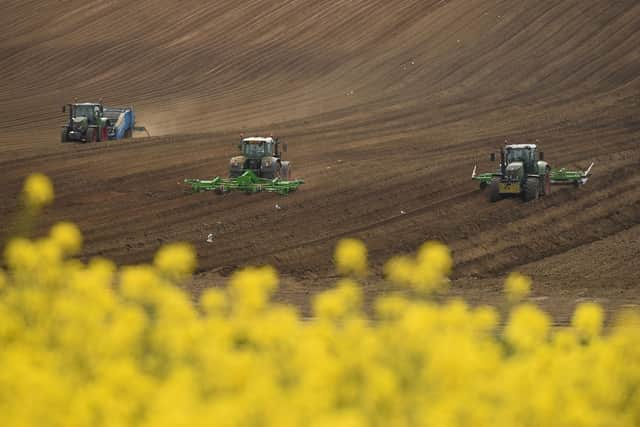Climate change: Farming subsidies can currently fund damage to nature and the environment. That needs to change – Ruth Taylor
Given that agriculture is Scotland’s main land use, farmers and crofters are key actors in making sure we reach climate change targets, restore nature, and produce food sustainably.
The way we support agriculture tends to fund measures that can damage the environment and nature and doesn’t adequately support those working in a nature-friendly way.
Advertisement
Hide AdAdvertisement
Hide AdThat’s why we welcome recent calls on the Scottish Government from the Just Transition Commission (JTC) to reform future farm support systems and help farmers deliver greater climate action.
To put the urgency of action into context, almost a fifth of Scotland's emissions come from agriculture and reduction trends are not where they need to be. Until this year, the sector’s emissions had remained static for over a decade and last year a report from WWF Scotland showed that policies currently proposed for agriculture get us less than halfway to where we need to be for Scotland to remain on track to reach net zero.
We also know that our changing climate is already impacting Scottish farming. Research from WWF found that extreme weather in 2017 contributed to losses of up to £161 million for Scotland’s farmers.
With the recent record-breaking temperatures, along with water scarcity and drought warnings, it’s clear that the sector is having to play catch-up to the changing climate, rather than taking proactive measures to drive down emissions.


This all shows that Scotland desperately needs a new and more ambitious system to support farming. The Scottish Government has a once-in-a-lifetime opportunity to reframe how it spends the £500 million that it directs every year to farm subsidies. This funding comes with few strings attached, benefits the most agriculturally productive and intensely farmed areas, and in some cases supports damage to the environment and nature.
We’re supporting Scottish Environment Link’s ‘Farm for Scotland’s Future’ campaign which is calling on the Scottish Government to use its forthcoming Agriculture Bill to develop a rural support system that works for climate, nature, and people.
We agree with the JTC’s calls for an ambitious farm-payment scheme and would like to see a proposed Just Transition Plan for Agriculture brought forward before the introduction of legislation.
This would give businesses and communities the guidance they need to invest in their future and receive the support necessary for the transition to regenerative farming systems while the Scottish Government frames how future support will guarantee reduced emissions, restore nature, and ensure that benefits are more fairly shared.
Advertisement
Hide AdAdvertisement
Hide AdScotland has the opportunity to lead the way by creating a system that helps achieve our climate ambitions, as well as people and nature. By using a greater share of public money to support nature and climate-friendly farming practices, we can help biodiversity thrive, lock in carbon and assist climate adaptation. This would also build resilience and bring benefits for farm businesses and rural communities.
Unless we take seriously the pressures that land, nature, and climate are facing now, we will exacerbate problems for future generations of land managers by locking-in increasing problems from pollution and the decline of nature. And without urgent action we will fail to deliver a just transition for farming.
Ruth Taylor, agriculture and land-use policy manager, WWF Scotland
Comments
Want to join the conversation? Please or to comment on this article.
